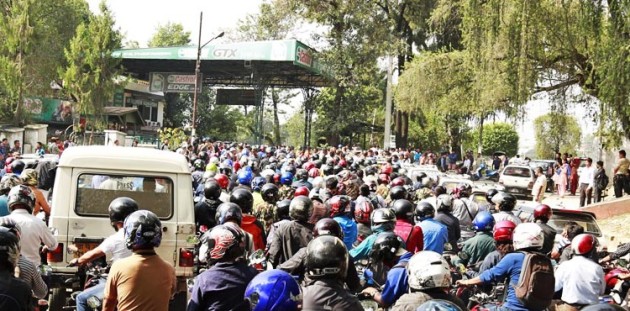From petrol pump to Singh Durbar (commentary)
By Sandesh Shrestha / Kathmandu: Serpentine queue of motorists outside the fuel stations in Nepal today is not just the result of the current political upheavals, but is testament to the failure and lack of vision on part of successive governments, rulers and the political parties of the country.
The citizens at large are not responsible for the acute shortage of essential supplies and the chaos in Tarai-Madhes, but they are compelled to take the greater toll of the crisis. The people are at the receiving end and are being punished unwarrantedly for what they had not and never committed.
The Nepali people have always remained in the backburner and for long are being subjected to crippling power outages, and are thirsty for a managed and reliable network of supply of drinking water. The deadly road accidents in the hilly regions which are annual tragic events need not be emphasized. The road infrastructure and the successive rulers’ reluctance to utilize the state coffers for constructing good and reliable modern roads are to be blamed for occurrence of such annual tragic events.
These tragedies and the chaos at every petrol pumps during the distribution of fuel symbolically attest to the fact that the leaders at the reign have never learned to enact a system and teach the people to adapt to a systematic form of civilization. The scenario that emerged at the petrol pumps during the recent times has shown the scale of chaos we are used to live in.
Recently, Nepal Oil Corporation (NOC) took the decision to distribute five liters of petrol to bikers in the Kathmandu Valley coinciding with the onset of Tihar festival and with a new rationing system. The bikers were then forced to queue up for up to four days at the designated fuel stations while many chose to hit the black market.
A friend of mine queued for four days to get five liters of petrol for his bike and when the day finally came it was not so easy. Sporadic fights broke out among consumers due to the overly congested line. People also alleged that the petrol pump owners were trying to conceal petrol so as to sell it on the black market. This allegation for many fuel stations became a sour fact when recently the government busted them for using remote controlled device attached inside the fuel dispensers for manipulation of the amount of fuel dispensed.
The Metropolitan Police Crime Division in collaboration with Nepal Bureau of Standards and Metrology raided at least 19 petrol pumps in the valley beginning November 22 and found them cheating the consumers. They were found to be dispensing less fuel than what consumers pay for. The petrol pumps tampered with the digital and manual fuel meters in such way as to increase the delivery pulse so that fuel pumped and money charged match. This has allegedly been going on for years now.
The petrol owners have been charged under the Black Marketing Act and Fraud Chapter of Muluki Ain. The police also arrested Indian mechanics who were running a racket to carry out what they termed as ‘pulsar fitting’ in digital dispensers and ‘gear fitting’ in manual ones.
The availability of coupon is just the beginning of an ordeal for the consumers who are forced to shoehorn their way in. “If I have to get petrol like this again I will better cut off my ears,” a person requesting anonymity complained after getting petrol for his car. He added that he is ready to pay as much price the black marketers demand from him.
The hassle at the fuel stations is a stark reminder of where our country is heading. The political unrest in Tarai plains and the Indian government’s economic embargo at the border may seem to be the prime cause of the prevailing crisis but it stems from the root of the country’s chronic ailment.
At the state-owned National Trading Limited the journalists are being provided at least three liters of petrol on a weekly basis and the arrangement was made after much criticism of the way of handling the scarce amount of fuel imported in the country.
It is high time the journalists too are given priority on such weekly basis which helps facilitate their tasks. The distribution must be eased through different fuel stations for the journalists so that they would not have to queue up for too long.RSS

